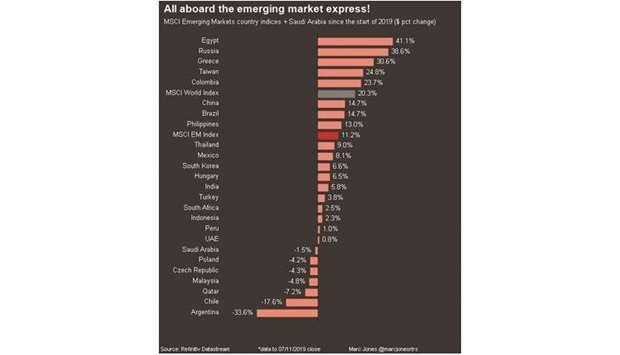Lingering doubts about a US-China trade deal, a Moody’s rating cut on India’s sovereign outlook and another power outage in South Africa dampened emerging markets yesterday but did little to take the shine off a strong week for stocks and currencies.
The MSCI index of EM stocks fell 0.6%, with Hang Seng shares falling 0.7% amid concerns that the death of a student at a Hong Kong university could trigger a fresh round of street protests.
Russia’s main MOEX index declined over 1% after disappointing quarterly results from aluminium giant Rusal and a slide in oil prices.
Heavyweight China shares were down about half a % as reports suggesting White House officials opposed rolling back tariffs on Beijing raised uncertainty around the first phase of a trade deal.
“It’s just been a number of comments made by various people but not a huge amount of detail,” said Gordon Smith, partner at Killik & Co’s Fund Research.
The yuan handed back some of its early gains, but was on course for its fifth straight weekly advance after the central bank guided its official midpoint above a key threshold, and as Chinese exports and imports contracted less in October than expected.
Global markets have rallied this week on signs of a US-Chinese deal to roll back tariffs on each other’s goods, though concerns about when and where a trade deal can be reached and reports that the rollback faced fierce internal opposition in the White House tamed market sentiment.
An index of EM currencies headed for its sixth straight week of gains, its longest such winning streak since Jan.
26, 2018, while its stocks counterpart was set for its fifth weekly advance in a row — its longest since July 5.
Global index provider MSCI said on Thursday mainland Chinese stocks, or A shares, would rise to a weight of 4.1% in the MSCI benchmark index, up from 2.55% currently.
The decision came as China steps up the opening of its capital markets amid its 16-month-old trade war with the United States.
The weight increase will be reflected effective at the market open on November 27, the index provider said.
“We have seen encouraging signs of China opening up.
It ultimately is a positive thing,” Killik’s Smith said. “A lot of international investors can’t simply invest, and clearly it’s an enormous market and will have a big impact.”
The Indian rupee fell to a three-week low at 71.31 per dollar after Moody’s cut India’s credit rating outlook to “negative” from “stable” — partly due to the government’s ineffectiveness in addressing economic weakness, which in turn has led to an increase in debt burden.
Indian stocks dropped 0.6%. Brazil’s real is among the worst performing currencies this week, on course for its biggest such decline in 11 weeks, hit by an underwhelming foreign response to the country’s biggest-ever, pre-salt oil auction.
Falling oil prices added pressure on Russia’s rouble, which fell 0.6%, while Turkey’s lira steadied.
South Africa’s benchmark stock index dropped about 1%, while the rand was down 0.6% after nationwide electricity blackouts overnight by ailing state utility Eskom spooked investors and rekindled worries about the economy. The firm said it had lost three generation units, pushing its emergency reserve capacity to “critical levels”.

.
